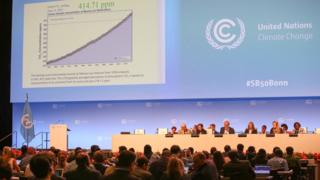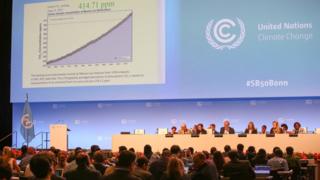UN climate talks: Delegates back IPCC report without targets

 Image copyright KIARA WORTH/IISD/ENB
Image copyright KIARA WORTH/IISD/ENB UN delegates in climate talks have agreed a “compromise” on how to include a key scientific report after two weeks of talks in Bonn, Germany.
Negotiators decided the report represented the “best available science”.
But they have not included any targets on emissions researchers said were vital to keep temperatures in check.
Some smaller island delegates claimed the move amounted to a surrender to fossil fuel producers.
Several wore T-shirts with the slogan “Science is not negotiable”.
The arguments here have focused on the Intergovernmental Panel on Climate Change (IPCC) and the report it produced last October on how the world would cope with a temperature rise of 1.5C this century.
The scientists concluded that it was possible to keep below this mark, but it would require huge cuts in emissions over the next years, with the world getting to net zero by 2050.
For small island states, who believe that they might cease to exist if temperatures go above this level, the report was seen as key to their survival.
But major fossil fuel producers were very wary. In December, the US, Russia, Saudi Arabia and Kuwait declined to welcome the study into the UN process.
That battle continued here in Bonn.
Small island states wanted to approve a text that would include reference to the scientists’ conclusion that carbon emissions would have to be reduced by 45% by 2030.
However, Saudi Arabia has been to the fore in wanting to include text that underlined the uncertainties in the report.
For the group of around 40 small island states, this has proved inflammatory.
“Disregarding or qualifying the best available science is tantamount to climate denialism,” said Ambassador Lois Young from Belize, who is the chair of the Alliance of Small Island States.
“We must not permit even a whiff of denialism in the multilateral process. We must use the IPCC Special Report on 1.5 to operationalise the Paris Agreement,” she said in a statement, referring to the 2016 international accord on climate change.
However rather than have a full scale war on the floor of the conference centre, a compromise text was agreed. The report was considered, the parties’ exchange of views was noted and the IPCC were thanked for providing the “best available science.”
For many attending, this fell well short of what was needed.
“The IPCC 1.5 report is a milestone report and we should welcome it, accept it and not negotiate it,” said Ian Fry, the lead negotiator from Tuvalu.
“This report, for countries like my own, indicates the threats that we face. We faced existential threats from climate change.”
Observers were also unimpressed by the actions of the Saudis in pushing so hard to underline the uncertainties in the report.
“During the negotiations, Saudi Arabia blocked substantive discussions called for by a large number of vulnerable developing countries on the IPCC report,” said Alden Meyer from the Union of Concerned Scientists.
“But while they may have succeeded in short-circuiting formal discussion of the report, the Saudis can’t prevent scientific fact from continuing to drive the heightened awareness among governments, the business community and the public of the need for an urgent response to the climate crisis.
It’s been a difficult week for many delegates here seeking rapid action on climate change. Apart from the row over the IPCC, there were concerns that the G20 meeting in Japan would also see a downgrading of commitments made to support the Paris climate agreement.
The EU was also under fire for its failure to agree a net zero emissions target for 2050.
Perhaps the one bright spot for the many glum attendees here was the fact that UK became the first major global economy to pass a net zero emissions law.
The battles on the role of science in the UN climate process are also unlikely to go away anytime soon. With two more IPCC reports due this year, there will be more rows down the road.
“It’s a battle that was lost but not the war,” said Yamide Dagnet, a former UK climate negotiator now with the World Resources Institute.
“We just have keep being creative. Our children are giving us lessons about that.”
Follow Matt on Twitter @mattmcgrathbbc.


